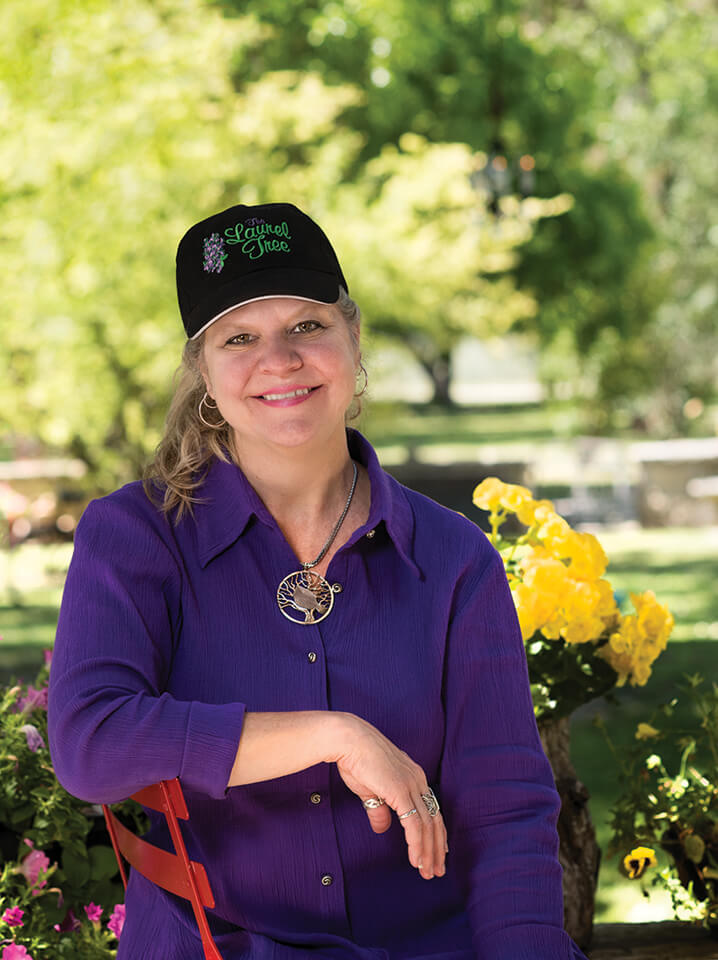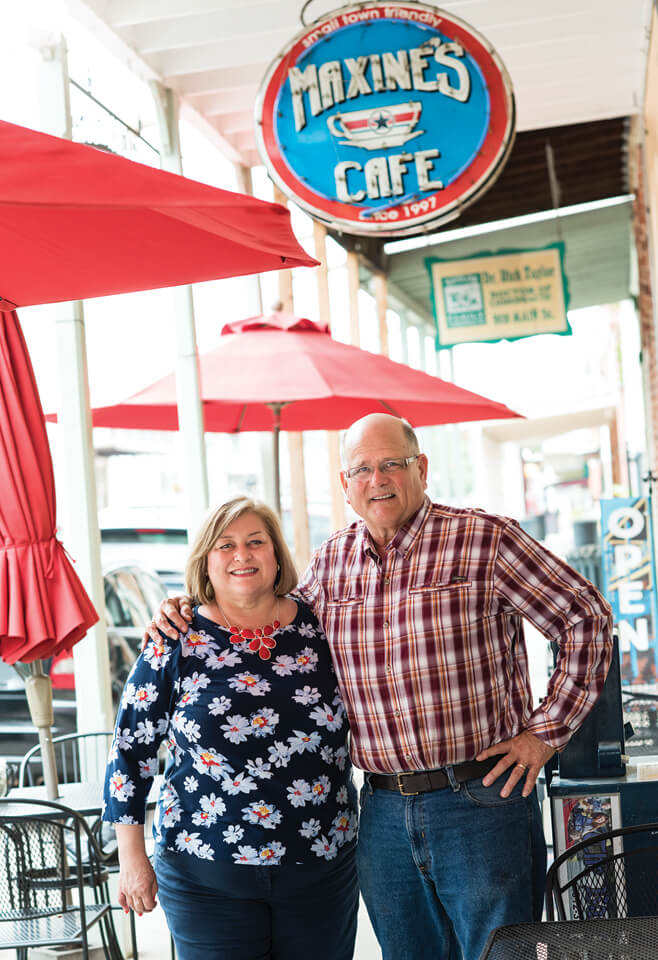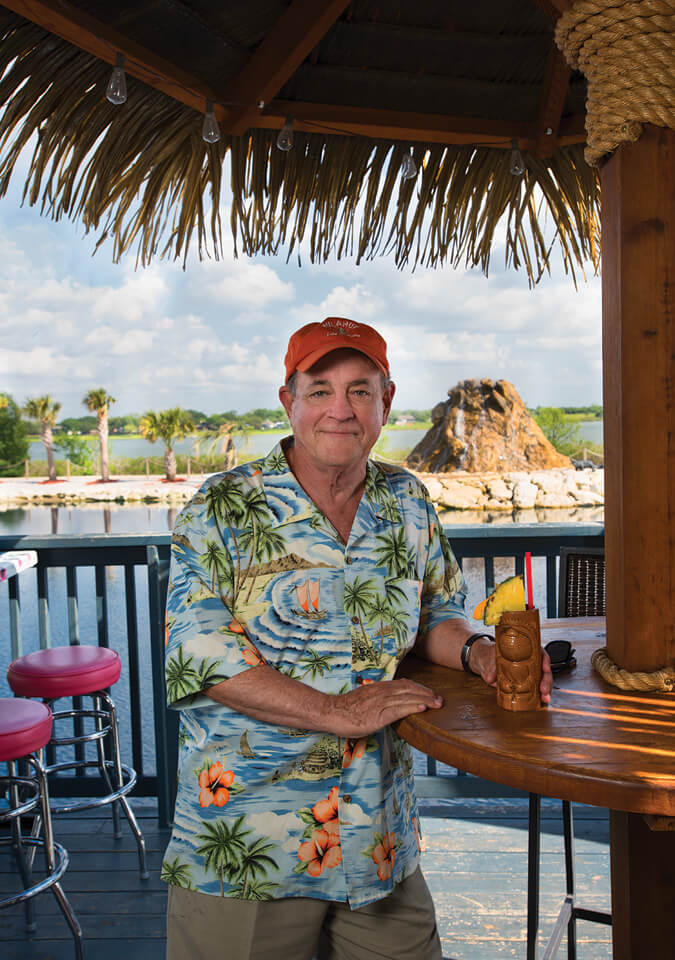Taste Makers
Alumni use their creativity and business skills to grab a slice of success serving
foodies across Texas.
June 6, 2017
In the tiny Hill Country town of Utopia, visitors can go to a place that feels a bit
like France. The Laurel Tree, run by Laurel Waters ('91), serves a four-course lunch and five-course dinner each Saturday, similar to
"guest tables" in the French countryside. Waters uses fresh herbs, vegetables and
edible flowers she picks from her kitchen garden, or potager, in her menu items. The
dining rooms are filled with French antiques that she's brought home from her travels.

Laurel Waters ('91) (Photo by Ahna Hubnik)
Her dream of owning a French restaurant began with a scholarship she won as a fashion design student at UNT. The scholarship took her to Paris where she immediately fell in love with the city. Nearly 15 years later, she opened her Utopian eatery, which is surrounded by red poppies each spring.
"I was scared that people wouldn't come way out here to have dinner," Waters says. "But it's been 12 years now and they come from everywhere."
Waters is among many alumni who have used their education at UNT and their own life experiences and passions to create some of the state's most distinctive and acclaimed restaurants. Some, such as Louis Lambert ('90) and Shadan Price ('08, '13), learned about the industry through the hospitality program in UNT's College of Merchandising, Hospitality and Tourism. Others, like David Sartain ('73, '79 M.B.A.), Elizabeth "Libby" Sartain ('77 M.B.A.) and Stephen "Duffy" Oyster ('71), are using skills they learned from UNT's College of Business as a main ingredient in their success.
In doing so, they're contributing to the latest food trends -- from going locavore to artistically blending tradition and cuisine and making food that is more accessible to more people. Waters grows her own locally sourced food. Oyster is merging two cultures in his restaurant concept. And Price is taking her culturally infused food to the street and building community.
But they love the restaurant industry for the same reason -- to create special experiences in making meals and pleasing their diners.
"You're trying to satisfy your customer," Lambert says, "in food, atmosphere, service level, music and uniform."
David Sartain says the importance of customer service was a big part of what he learned at UNT.
"It starts and ends with your customers," Sartain says. "They go away with the experience we intend them to have -- the greetings and smiles, the friendliness they encounter."
Destination dining
When Waters spent a semester studying at the Paris Fashion Institute in 1990, she fell in love with the city's food, the art and the museums.
"Paris is magnetic and magical," she says.
She couldn't forget it, even in the midst of a successful career in computer-aided design for the apparel industry in Dallas. Her mother taught her to cook when she was young, and she always enjoyed entertaining for her friends. In 1998, she returned to Paris to take a 10-week basic cuisine and pastry course at Le Cordon Bleu but eventually earned the entire Grande Diplôme. During her time off, Waters took the train to explore the countryside, watching how grapes are harvested in Bordeaux, touring vineyards in Burgundy and exploring the châteaux of the Loire Valley.
"Provence really stole my heart with perched villages, the markets, the scenery, the architecture and the lifestyle," she says. "I visited many times exploring new villages, trying new restaurants and frequenting many outdoor antique fairs."
Waters also met different chefs and ended up working at three famous restaurants in Provence. She became particularly intrigued with table d'hôte, a French tradition in which travelers could visit someone's home for supper that night, eating among strangers.
"I just started dreaming up my own guest table," she says.
Her family has owned property in Utopia since 1972, and the Texas Hill Country reminded her of Provence, with similar mountains, spring-fed creeks and livestock grazing in the fields.
"I thought about moving to Provence," she says, "but decided I could bring everything I loved back home."
She opened The Laurel Tree in 2004. Her courses include a meat and seafood selection that change every week. Since it's in a dry county, guests bring their own wine. And on the grounds is a treehouse built by Pete Nelson of the show Treehouse Masters, where a party of six can eat.
Reservations must be made in advance for the restaurant. Despite the popularity, Waters says it will continue to be open only on Saturdays.
"I love visiting with diners about where they are from and to hear their story," she says. "We have the most interesting people come to dine and celebrate some of their most wonderful moments with us."
Community meeting spot

David ('73, '79 M.B.A.) and Libby Sartain ('77 M.B.A.) (Photo by Ahna Hubnik)
Like Waters, David and Libby Sartain found second careers as restaurateurs in the Texas Hill Country. But that wasn't their plan.
The Sartains, who met in graduate school at UNT and married in 1977, both had high-powered careers in the Silicon Valley when they retired in the mid-2000s. Libby wanted to restore the two-story Greek revival house, called Ancient Oaks Plantation, that her ancestor had built in 1857 south of Bastrop.
While Libby was working on the home, David was looking for investments. He bought one of the downtown buildings, which came with Maxine's Restaurant. They created new recipes for breakfast, lunch and dinner, building around the home cooking concept with large portions, and rebranded it as Maxine's Cafe. And in 2008, Texas Monthly magazine named it one of the state's top 40 small-town breakfast cafés. People were pouring in.
Their specialty -- pancakes that spill over the 12-inch plate -- appeared on Texas Monthly's cover in 2011. Families often put a platter of pancakes in the middle of the table for their young children to share.
"We've seen it parceled out among four hungry boys and it disappears," David says.
The atmosphere is just as attractive as the food, with the café serving as a meeting spot for customers. The fellowship stems from the employees, whom the Sartains treat like family.
Libby, who worked as vice president of human resources at Southwest Airlines and Yahoo, says, "The café is kind of an iconic small-town experience that people enjoy, like a Sunday drive. We want our employees to really deliver that kind of experience."
The bigger picture

Louis Lambert ('90) (Photo by Ahna Hubnik)
Chef Louis Lambert also works to make every meal an experience.
While in the process of creating a new restaurant for a hotel in San Cristóbal, Mexico, he met with the architect about concept, design and the details. He sought out local cuisine in the village to get inspiration. He discussed plates and bowls with the china company in Guadalajara. And he worked with the woodworker who made the platters.
Then Lambert hired a chef, put the system in place and oversaw the concept until the restaurant opened.
"I love that challenge," says Lambert, who oversees the concepts for restaurants for his sister's Bunkhouse Group hotels, including the one in San Cristóbal. "As much as I love being in the kitchen, I think that's what excites me now. It's not just the food, but the plate it's going on. It's the table or chair, what paper the menu is printed on. It's a bigger picture than being the food guy."
Lambert has made a name as an owner or investor in some of Texas' favorite restaurants, including Fort Worth's Dutch's Hamburgers and, in Austin, Lambert's BBQ, Jeffrey's fine dining, June's café and Jo's coffee shop.
Lambert grew up around cooks -- such as his grandmother and her Cajun cooking and the camp cooks on his grandfather's ranch -- which inspired him to co-write the Big Ranch, Big City Cookbook.
After graduating from UNT, he attended the Culinary Institute of America, considered the most prestigious culinary school in the world.
Although he now focuses on the big picture of his restaurants, he enjoys the process of cooking.
"Even when I'm not near a kitchen," Lambert says, "I get inspired by a smell or sight that makes me want to find a place to cook."
Turning things around

Stephen 'Duffy' Oyster ('71) (Photo by Ahna Hubnik)
Stephen "Duffy" Oyster loves innovating. In fact, his popular Hula Hut restaurants, located in Austin and Little Elm, combine Mexican and Polynesian flavors. Diners eat their meals -- such as Hawaiian fajitas and mango-poblano chile quesadillas -- while overlooking the lake.
The fun, relaxing vibe of Hula Hut reflects Oyster's view of his career in the restaurant and commercial real estate business.
"This isn't like having a job," he says. "It's fun to get up in the morning and roll up my sleeves to still do stuff."
His business career began early. In high school and college, he would buy used cars and rent houses.
"I like buying things that need to be fixed up and turned around," Oyster says.
After earning his degree in management, he worked in marketing at Del Monte and Dunkin' Donuts. He and other investors created Foodmakers, which bought out Jack-in-the-Box. In 2001, he bought out Pancho's Mexican Buffet and revamped the menu. He also owned 14 franchises of Tony Roma's.
Oyster established Hula Hut in 1993, and its location on Lake Austin has made it one of Austin's most popular hangouts. Oyster also owns Mozart's Coffee Roasters and a marina in the same area. The town leaders of Little Elm lured him to open a second Hula Hut on Lake Lewisville in 2015. A dedicated UNT donor, Oyster also has hosted a mixer for the UNT Alumni Association at the Little Elm location.
While he has downsized the number of restaurants he owns from 70 to three and has survived a bout of cancer, he says he's not going to retire.
"The restaurant business is for me very exciting because there are so many aspects," he says. "It's marketing. It's good food. It's managing employees. It's finding the right people. You never do the same thing the same day."
Taking it to the street

Shadan ('08, '13) and Trey Price ('07) (Photo by Ahna Hubnik)
When Shadan Price pulls up her food truck for customers in Denton, she wants them to try something they've never tasted before.
"It's Middle Eastern flavors and stuff that comes out of my head," she says of Leila's Food Truck.
Her most popular item is the falafel burger, not fried like it usually is, but grilled on a flat top like a hamburger. Her potato poppers are a twist of potato cutlets, but smaller, fried and with added spices. Her grilled cheese sandwich boasts Muenster and feta cheeses with roasted grapes and a bit of honey.
Customers are intrigued by the offerings.
"At first, they're a little hesitant," says Price, who was born in Iran and grew up
in Plano. "Then they try it and they love it. I like hearing, 'I wasn't expecting
to like a vegetarian food truck.'"
Price first got a degree in art education and taught for two years. She then became
a vegetarian and realized she loved cooking. She particularly liked replicating her
mother's Persian recipes and the creativity involved -- from adjusting the recipes
to making a pretty plate. She then thought she could open her own restaurant.
Price returned to UNT to earn her degree in hospitality management, a program that emphasizes the industry's business aspects, such as accounting. While she was saving money to buy a truck, she worked at Mean Greens, UNT's nationally recognized all-vegan dining hall -- first as a student and then working her way up to full-time sous chef and kitchen supervisor.
She opened Leila's last year, choosing a popular female name from the Middle East. The food truck cost less and creates a more flexible schedule than a brick-and-mortar restaurant.
Price conducts most of her business in Denton's two food parks, Backyard on Bell and Austin Street Truck Stop. Her husband, Trey Price ('07), a geography graduate who works for Denton Municipal Electric, also helps her out behind the scenes and with social media.
Price says she feels like she's contributing to what makes Denton great by offering options to vegetarians and vegans, participating in community events and representing her culture.
"Denton is a community that includes many immigrants, myself included," she says. "I've brought a bit of Iran, along with other Middle Eastern cuisines, here with me."